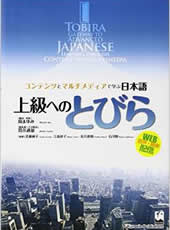『上級へのとびら』(本冊) TOBIRA: Gateway to Advanced Japanese
 岡まゆみ [構成・執筆] 筒井通雄 [総監修・文法解説]
岡まゆみ [構成・執筆] 筒井通雄 [総監修・文法解説]
近藤純子・江森祥子・花井善朗・石川智 [執筆]
B5/420ページ 2009年7月刊行
ISBN:978-4-87424-447-0 C0081
本体3,300円+税 | Based price: 3,300yen
→ サンプルページを見る View Sample Pages(.pdf)
日本の地理・歴史からポップカルチャーまで、様々なトピックを通して4技能を伸ばす画期的中級日本語教科書です。マルチメディアを使用した言語習得を促し、外国在住の学習者でも日本語環境に触れることができるようなサポートも確立しています。
TOBIRA is a groundbreaking intermediate-level Japanese textbook designed to develop the four language skills through the study of a variety of different topics from Japanese geography and history to pop culture. TOBIRA promotes language learning through the use of multimedia materials and establishes a support system via the Internet so that learners outside Japan have access to a Japanese language environment.
第1課 日本の地理
〔読み物〕「日本の地理」
〔主なトピック〕地理、名所、名物、行事、祭り、昔話
〔会話文〕質問をする/聞き返す
〔言語ノート〕あいづちとフィラー
第2課 日本語のスピーチスタイル
〔読み物〕「日本語のスピーチスタイル」
〔主なトピック〕スピーチレベルの使い分け、男女の言葉、
言葉の省略と短縮と倒置、書き言葉と話し言葉電話の会話、
Eメールを出す
〔会話文〕謝る
〔言語ノート〕Sentence-final particles (終助詞) Part 1
第3課 日本のテクノロジー
〔読み物〕「人とロボット」
〔主なトピック〕ロボット、テクノロジーの発達、外来語とカタカナ語、
インターネット辞書の使い方
〔会話文〕依頼する/感謝する
〔言語ノート〕カタカナ語
第4課 日本のスポーツ
〔読み物〕「スポーツを通して学ぶ心」
〔主なトピック〕日本のスポーツ、日本の武道、心・技・体の考え方、
クラブ活動、先輩と後輩の考え方
〔会話文〕相談する
〔言語ノート〕日本語の数字と単位
第5課 日本の食べ物
〔読み物〕「インスタントラーメン発明物語」
マンガで読む「カップヌードル誕生ストーリー」
〔主なトピック〕インスタントラーメン、ファーストフード、寿司
〔会話文〕説明する/考えを言う
〔文化ノート〕お米の話
〔言語ノート〕がandけれども
第6課 日本人と宗教
〔読み物〕「日本人の生活と宗教」「日本の神話:天の岩戸」
〔主なトピック〕宗教、宗教的習慣、行事、信仰、神話
〔会話文〕グラフを使って説明する/自分の意見を言う
〔文化ノート〕日本の迷信
〔言語ノート〕ものandこと
第7課 日本のポップカルチャー
〔読み物〕「マンガの神様:手塚治虫」「日本語のオノマトペ 」
〔主なトピック〕日本のポップカルチャー、マンガ、手塚マンガ、
オノマトペ、血液型
〔会話文〕困った状況を説明する/苦情や不平を言う
〔文化ノート〕日本のカワイイカルチャー
〔言語ノート〕連濁:「゙」のつく言葉
第8課 日本の伝統芸能
〔読み物〕「狂言と笑い」
〔主なトピック〕日本の伝統芸能、狂言
〔会話文〕ストーリーを話す
〔発表〕物語を紹介する
〔文化ノート〕日本の歌
〔言語ノート〕ノ形容詞(no-adjective)
第9課 日本の教育
〔読み物〕「日本の教育の現状」
〔主なトピック〕日本の教育制度のいい点と問題点、学歴社会、
受験戦争、いじめ、 登校拒否
〔会話文〕ほめる/ほめられる
〔文化ノート〕日本人のジェスチャー
〔言語ノート〕という
第10課 日本の便利な店
〔読み物〕「自動販売機大国ニッポン」
〔主なトピック〕自動販売機の便利さと問題点、日本のコンビニ(エンスストア)
〔会話文〕情報を求める/伝える
〔文化ノート〕標準語と方言
第11課 日本の歴史
〔読み物〕「日本の輸入の歴史」
〔主なトピック〕日本の輸入の歴史、織田信長、豊臣秀吉、徳川家康
〔会話文〕過去の事柄について話す
〔発表〕自分の国の歴史的な出来事、歴史的人物などについて発表する
〔文化ノート〕カレーライスって日本料理?
〔言語ノート〕ちょっと変わったイ形容詞「多い」、副詞(句)の名詞修飾
第12課 日本の伝統工芸
〔読み物〕「和紙からのメッセージ」
〔主なトピック〕和紙の特性、千羽鶴の話
〔会話文〕ものの作り方を紹介する
〔発表〕ものの作り方、使い方、仕方などについて発表する
〔文化ノート〕ものづくりニッポン
〔言語ノート〕大きい vs. 大きな、The absence of particles(無助詞)
第13課 日本人と自然
〔読み物〕「私と先生」「俳句:世界一短い詩」
〔主なトピック〕 日本の自然、自然描写、俳句、川柳、標語
〔会話文〕話を発展させる(追加質問をする/感想を言う)
〔発表〕インタビューをして発表する
〔文化ノート〕万葉集と和歌/短歌
〔言語ノート〕Sentence-final particles(終助詞)Part 2
第14課 日本の政治
〔読み物〕「政治家になるための条件」
〔主なトピック〕日本の政治制度、世襲議員、タレント議員のいい点と問題点、
マニフェスト
〔討論〕意見を言う/賛成をする/反対をする
〔文化ノート〕日本の皇室
〔言語ノート〕んです
第15課 世界と私の国の未来
〔読み物〕「世界がもし100人の村だったら」
「日本村100人の仲間たち」
「マータイさんのMOTTAINAIキャンペーン」
〔主なトピック〕世界の社会問題、もったいない運動「もったいないばあさん」
〔討論〕意見を言う/賛成をする/反対をする
〔言語ノート〕たとえ/メタファーの表現
Chapter 1: The Geography of Japan
[Reading] “The Geography of Japan”
[Main Topics] Geography, place names, local specialties, events, festivals, folk tales
[Conversation] Asking questions/active listening
[Language Note] aizuchi and filler wordsChapter 2: Speech Styles in Japanese
[Reading] “Speech Styles in Japanese”
[Main Topics] politeness levels, gendered speech, contractions and inversions, written and spoken language, phone conversations and e-mail in Japanese
[Conversation] Apologizing
[Language Note] Sentence-final particles, Part 1Chapter 3: Japanese Technology
[Reading] “People and Robots”
[Main Topics] Robots, technological advances, foreign loan words and katakana words, using online dictionaries
[Conversation] Asking for favors and expressing gratitude
[Language Note] Katakana wordsChapter 4: Sports in Japan
[Reading] “Training the heart through sports”
[Main Topics] Sports in Japan, Japanese martial arts, the relationship between mind/heart, body and technique, club activities, senpai and kohai
[Conversation] Asking for advice and getting information
[Language Note] Japanese numbers and units of measurementChapter 5: Japanese Food
[Reading] “The Tale of Instant Ramen”
“The Birth of Cup Noodles”: a manga
[Main Topics] Instant ramen, fast food, sushi
[Conversation] Explaining something/expressing one’s thoughts
[Cultural Note] On Rice
[Language Note] が and けれどもChapter 6: The Japanese and Religion
[Reading] “Religion in ” “A Japanese Legend: The Well of Heaven”
[Main Topics] Religion, religious customs and events, faith, legends
[Conversation] Explaining using graphs/expressing one’s opinions
[Cultural Note] Japanese Superstitions
[Language Note] もの and ことChapter 7: Japanese Pop Culture
[Reading] “The God of Manga: Tezuka Osamu” “Onomatopoeia in Japanese”
[Main Topics] Japanese pop culture, manga, Tezuka manga, onomatopoeia, blood type
[Conversation: Explaining problems/ expressing complains and grievances
[Cultural Note] Japanese “kawaii culture”
[Language Note] Rendaku (Sequential Voicing)Chapter 8: Japanese Traditional Performing Arts
[Reading: “Kyōgen and Laughter”
[Main Topics] Japanese traditional performing arts, Kyōgen
[Conversation] Telling a story
[Speech] summarizing a tale
[Cultural Note] Japanese songs
[Language Note] no-adjectivesChapter 9: Education in Japan
[Reading] “Education in Japan Today”
[Main Topics] the merits and demerits of Japan’s educational system, academic credentials and society, school admissions wars, bullying, school refusal
[Conversation] Giving and receiving compliments
[Cultural Note] Gestures in Japanese
[Language Note] というChapter 10: Japan’s Convenience Stores
[Reading] “Japan: Land of the Vending Machine”
[Main Topics] the merits and demerits of vending machines, Japan’s konbini (convenience stores)
[Conversation] Exchanging information
[Cultural Note] Standard Japanese and dialectsChapter 11: The History of Japan
[Reading] “The History of Importing in Japan”
[Main Topics] the history of things Japan has imported from abroad, Oda Nobunaga, Toyotomi Hideyoshi, Tokugawa Ieyasu
[Conversation] Talking about historical events
[Speech] Giving a speech on the historical events and figures of one’s country
[Cultural Note] Is curry rice Japanese food?
[Language Note] ōi: an i-adjective not quite like the others, the use of adverbs in noun modificationChapter 12: Traditional Japanese Crafts
[Reading] “What we can learn from Washi (Japanese paper)”
[Main Topics] The special characteristics of washi, the story of the thousand paper cranes
[Conversation] Explaining how to make something
[Speech] Giving a speech on how to make/use/do/etc. something
[Cultural Note] Crafts in Japan
[Language Note] 大きい vs. 大きな、the absence of particlesChapter 13: The Japanese and Nature
[Reading] “Sensei and I” “Haiku [Main Topics] Nature in Japan, depictions of nature, haiku, senryū, mottos
[Conversation] Developing a conversation (Asking follow-up questions/expressing one’s impressions of things)
[Speech] Giving a speech based on an interview
[Cultural Note] The Man’yōshū and waka/tankaChapter 14: Japanese Politics
[Reading: “What It Takes to Become a Politician”
[Main Topics] The Japanese political system, second-generation MPs (members of parliament), the pros and cons of celebrity MPs, political demonstrations
[Debate] Expressing one’s opinions/agreeing/disagreeing
[Cultural Note] The Japanese Imperial Family
[Language Note] んですChapter 15: The Future of Your Country and the World
[Reading] “If the world were a village of 100 people”
“If Japan were a village of 100 people”
“Ms. Maathai’s Mottainai Campaign”
[Main Topics] The world’s social problems, the mottainai movement, mottainai grannies
[Debate] Expressing one’s opinions/agreeing/disagreeing
[Language Note] Similes and metaphors


